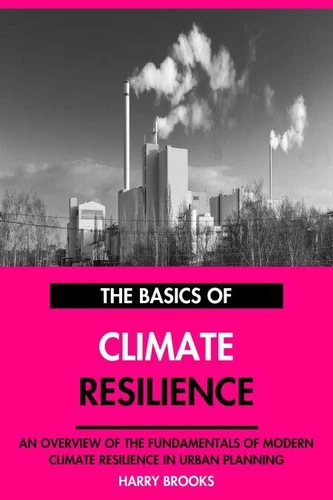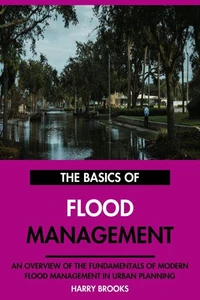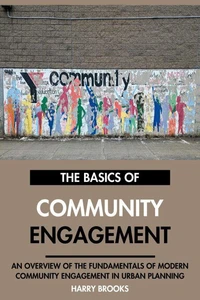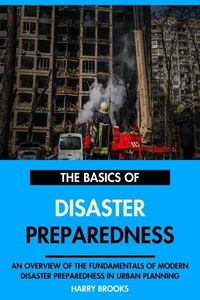Nouveauté
The Basics of Modern Climate Resilience: An Overview of the Fundamentals of Climate Resilience in Urban Planning.
Par :Formats :
Disponible dans votre compte client Decitre ou Furet du Nord dès validation de votre commande. Le format ePub protégé est :
- Compatible avec une lecture sur My Vivlio (smartphone, tablette, ordinateur)
- Compatible avec une lecture sur liseuses Vivlio
- Pour les liseuses autres que Vivlio, vous devez utiliser le logiciel Adobe Digital Edition. Non compatible avec la lecture sur les liseuses Kindle, Remarkable et Sony
- Non compatible avec un achat hors France métropolitaine
 , qui est-ce ?
, qui est-ce ?Notre partenaire de plateforme de lecture numérique où vous retrouverez l'ensemble de vos ebooks gratuitement
Pour en savoir plus sur nos ebooks, consultez notre aide en ligne ici
- FormatePub
- ISBN8231576104
- EAN9798231576104
- Date de parution10/08/2025
- Protection num.Adobe DRM
- Infos supplémentairesepub
- ÉditeurWalzone Press
Résumé
As the effects of climate change become increasingly evident, the concept of resilience has gained prominence in discussions surrounding urban planning and development. This eBook aims to explore the intricate relationship between climate and resilience, providing readers with a comprehensive understanding of how urban environments can adapt to and thrive amidst the challenges posed by a changing climate. The urgency of addressing climate change cannot be overstated.
From rising sea levels to extreme weather events, the impacts of climate change are felt worldwide, affecting ecosystems, economies, and communities. Urban areas, which are often densely populated and heavily reliant on infrastructure, face unique vulnerabilities. Therefore, the need for resilience in urban planning has never been more critical. This eBook delves into the fundamentals of climate resilience, examining the strategies and practices that urban planners can employ to create adaptive, sustainable cities.
Each chapter will focus on different aspects of climate resilience, providing insights into the challenges and opportunities that lie ahead. Readers will gain a deeper understanding of how to integrate resilience into urban planning processes, ensuring that cities are equipped to handle the uncertainties of climate change. Through detailed analysis and real-world examples, this eBook aims to inspire urban planners, policymakers, and community members to take proactive steps toward building resilient urban environments.
The journey toward resilience is not without its challenges, but it is a necessary endeavor for safeguarding the future of our cities and the well-being of their inhabitants. As we embark on this exploration of climate resilience in urban planning, it is essential to recognize that the path forward is not linear. It requires collaboration, innovation, and a willingness to adapt to new information and changing circumstances.
By embracing a resilience- oriented approach, we can create urban spaces that not only withstand the impacts of climate change but also thrive in the face of adversity. In the chapters that follow, we will delve deeper into the various dimensions of climate resilience, exploring the fundamental principles, strategies, and case studies that illustrate the importance of this concept in urban planning.
Together, we can work toward a future where our cities are not just surviving but flourishing in an era of climate uncertainty.
From rising sea levels to extreme weather events, the impacts of climate change are felt worldwide, affecting ecosystems, economies, and communities. Urban areas, which are often densely populated and heavily reliant on infrastructure, face unique vulnerabilities. Therefore, the need for resilience in urban planning has never been more critical. This eBook delves into the fundamentals of climate resilience, examining the strategies and practices that urban planners can employ to create adaptive, sustainable cities.
Each chapter will focus on different aspects of climate resilience, providing insights into the challenges and opportunities that lie ahead. Readers will gain a deeper understanding of how to integrate resilience into urban planning processes, ensuring that cities are equipped to handle the uncertainties of climate change. Through detailed analysis and real-world examples, this eBook aims to inspire urban planners, policymakers, and community members to take proactive steps toward building resilient urban environments.
The journey toward resilience is not without its challenges, but it is a necessary endeavor for safeguarding the future of our cities and the well-being of their inhabitants. As we embark on this exploration of climate resilience in urban planning, it is essential to recognize that the path forward is not linear. It requires collaboration, innovation, and a willingness to adapt to new information and changing circumstances.
By embracing a resilience- oriented approach, we can create urban spaces that not only withstand the impacts of climate change but also thrive in the face of adversity. In the chapters that follow, we will delve deeper into the various dimensions of climate resilience, exploring the fundamental principles, strategies, and case studies that illustrate the importance of this concept in urban planning.
Together, we can work toward a future where our cities are not just surviving but flourishing in an era of climate uncertainty.
As the effects of climate change become increasingly evident, the concept of resilience has gained prominence in discussions surrounding urban planning and development. This eBook aims to explore the intricate relationship between climate and resilience, providing readers with a comprehensive understanding of how urban environments can adapt to and thrive amidst the challenges posed by a changing climate. The urgency of addressing climate change cannot be overstated.
From rising sea levels to extreme weather events, the impacts of climate change are felt worldwide, affecting ecosystems, economies, and communities. Urban areas, which are often densely populated and heavily reliant on infrastructure, face unique vulnerabilities. Therefore, the need for resilience in urban planning has never been more critical. This eBook delves into the fundamentals of climate resilience, examining the strategies and practices that urban planners can employ to create adaptive, sustainable cities.
Each chapter will focus on different aspects of climate resilience, providing insights into the challenges and opportunities that lie ahead. Readers will gain a deeper understanding of how to integrate resilience into urban planning processes, ensuring that cities are equipped to handle the uncertainties of climate change. Through detailed analysis and real-world examples, this eBook aims to inspire urban planners, policymakers, and community members to take proactive steps toward building resilient urban environments.
The journey toward resilience is not without its challenges, but it is a necessary endeavor for safeguarding the future of our cities and the well-being of their inhabitants. As we embark on this exploration of climate resilience in urban planning, it is essential to recognize that the path forward is not linear. It requires collaboration, innovation, and a willingness to adapt to new information and changing circumstances.
By embracing a resilience- oriented approach, we can create urban spaces that not only withstand the impacts of climate change but also thrive in the face of adversity. In the chapters that follow, we will delve deeper into the various dimensions of climate resilience, exploring the fundamental principles, strategies, and case studies that illustrate the importance of this concept in urban planning.
Together, we can work toward a future where our cities are not just surviving but flourishing in an era of climate uncertainty.
From rising sea levels to extreme weather events, the impacts of climate change are felt worldwide, affecting ecosystems, economies, and communities. Urban areas, which are often densely populated and heavily reliant on infrastructure, face unique vulnerabilities. Therefore, the need for resilience in urban planning has never been more critical. This eBook delves into the fundamentals of climate resilience, examining the strategies and practices that urban planners can employ to create adaptive, sustainable cities.
Each chapter will focus on different aspects of climate resilience, providing insights into the challenges and opportunities that lie ahead. Readers will gain a deeper understanding of how to integrate resilience into urban planning processes, ensuring that cities are equipped to handle the uncertainties of climate change. Through detailed analysis and real-world examples, this eBook aims to inspire urban planners, policymakers, and community members to take proactive steps toward building resilient urban environments.
The journey toward resilience is not without its challenges, but it is a necessary endeavor for safeguarding the future of our cities and the well-being of their inhabitants. As we embark on this exploration of climate resilience in urban planning, it is essential to recognize that the path forward is not linear. It requires collaboration, innovation, and a willingness to adapt to new information and changing circumstances.
By embracing a resilience- oriented approach, we can create urban spaces that not only withstand the impacts of climate change but also thrive in the face of adversity. In the chapters that follow, we will delve deeper into the various dimensions of climate resilience, exploring the fundamental principles, strategies, and case studies that illustrate the importance of this concept in urban planning.
Together, we can work toward a future where our cities are not just surviving but flourishing in an era of climate uncertainty.















